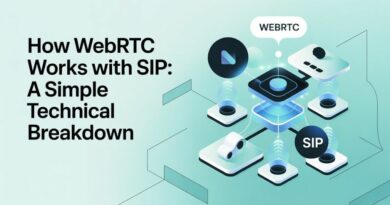The Rise of the AI Tutor
As AI continues to take hold in just about every aspect of society, one of the most transformative tools to accompany it may not be a new gadget or app, but rather an ever-present digital mentor: the AI tutor. According to Nvidia CEO Jensen Huang, this accessory to AI is already an indispensible partner.
Speaking on Huge Conversations, a popular YouTube interview series hosted by journalist Cleo Abram, Huang shared a piece of advice he believes everyone should follow: “Get an AI tutor.”
“I have a personal [artificial intelligence] tutor with me all of the time. And I think that feeling should be universal,” Huang said in the episode.
This isn’t just a futuristic fantasy. Huang uses his own AI tutor — specifically, Perplexity AI, a search engine powered by generative AI — daily to explore topics ranging from computer science to digital biology. He describes it as “really helpful” and encourages others to adop similar tools to enhance their learning and productivity.
Why AI Tutors Matter
AI tutors are more than just chatbots or search engines. They’re interactive, adaptive systems designed to teach, explain, and guide users through complex concepts — whether you’re learning a new language, mastering Python programming, or brushing up on quantum physics.
Some platforms, like Khanmigo (offered by Khan Academy for $4/month), are explicitly built for educational purposes. Others, such as Sizzle, offer free tutoring services tailored to students and professionals alike. Even general-purpose AI assistants like OpenAI’s ChatGPT and Google’s Gemini can function as rudimentary tutors when used effectively.
As Huang noted during his conversation with Abram:
“All of those things [are] going to really make you feel empowered and I think that’s going to be our future.”
A New Era of Personalised Learning
The promise of AI tutors lies in their ability to personalise education. Unlike traditional classrooms, where instruction must cater to a broad group, AI tutors can adapt to each learner’s pace, style, and interests. This level of customisation has long been the dream of educators, and now, thanks to advances in machine learning and natural language processing, it’s becoming a reality.
For example, AI tutors can:
- Break down difficult problems into manageable steps
- Offer instant feedback and corrections
- Simulate conversations to improve language skills
- Generate practice exercises tailored to individual needs
Such capabilities are particularly valuable in fields like coding, mathematics, and data analysis — areas where Huang sees immense potential.
“AI programs can teach you things — anything you like — help you program, help you write, help you analyse, help you think, help you reason,” he explained.
Beyond Education: A Tool for Professional Growth
While students stand to gain a lot from AI tutors, professionals shouldn’t overlook their benefits either. Huang himself uses AI tools to draft speeches, refine ideas, and explore new domains — a practice echoed by many executives and entrepreneurs.
At a Wired event in 2023, Huang revealed that he often starts writing using AI-generated drafts before refining them himself. This hybrid approach allows him to leverage the speed and breadth of AI while maintaining the nuance and creativity only humans can provide.
However, experts caution against relying too heavily on these tools. Generative AI models still struggle with accuracy and can produce factual errors or misleading information. Most recommend treating AI as a co-pilot — a tool to assist, not replace, human effort.
The Road Ahead: Superhuman Thinking with AI Help
Looking forward, Huang envisions a future where AI doesn’t just augment our abilities — it redefines what it means to be intelligent.
“I think that [in] the next decade, intelligence — not for everything, but for some things — would basically become superhuman,” he said.
He imagines a world where every person has access to a “super AI” assistant that excels in specific domains, enabling individuals to tackle challenges once thought impossible. This vision aligns with broader trends in AI-augmented cognition, where machines don’t just compute data but also help us interpret and act on it more effectively.
But not everyone shares Huang’s optimism.
The Ethical and Economic Challenges
As AI becomes more integrated into daily life, concerns about job displacement and economic disruption grow louder. A 2024 Gallup survey found that roughly 75% of Americans worry AI will lead to fewer jobs for humans. Meanwhile, a McKinsey report from 2023 estimated that nearly half of all work activities could be automated by 2030.
Mustafa Suleyman, CEO of Inflection AI and former head of AI at DeepMind, warns in his book The Coming Wave that while AI will boost productivity and growth, it will also displace millions of workers who must then reskill and transition to new roles.
“They will make us smarter and more efficient for a time, and will unlock enormous amounts of economic growth, but they are fundamentally labor replacing,” Suleyman wrote.
Huang, however, remains bullish. Having led Nvidia through rapid technological evolution, he argues that AI won’t eliminate the need for human talent — it will elevate it.
“It actually empowers me and gives me the confidence to go tackle more and more ambitious things,” he said. “What would that make you feel? Well, it’s going to empower you. It’s going to make you feel confident.”
Final Thoughts: Embracing the Future
The rise of AI tutors marks a turning point in how we learn, work, and grow. Whether you’re a student seeking academic support, a professional looking to upskill, or simply someone curious about the world, AI tutors offer unprecedented opportunities to expand your knowledge and capabilities.
Still, as with any powerful technology, there are risks and responsibilities involved. Users must remain critical, fact-check outputs, and use AI ethically and responsibly.
For those willing to embrace this change, the rewards could be profound — not just in terms of efficiency or convenience, but in unlocking human potential on a scale never seen before.
As Huang concludes:
“We’re going to become superhumans — not because we have superpowers. We’re going to become superhumans because we have super AIs.”
We’d love your questions or comments on today’s topic!
For more articles like this one, click here.
Thought for the day:
“Nature has given us all the pieces required to achieve exceptional wellness and health, but has left it to us to put these pieces together.” Diane McLaren



